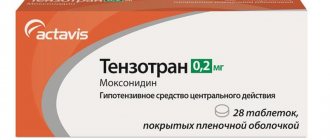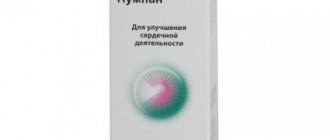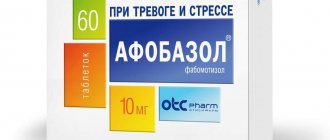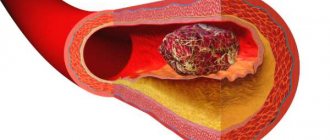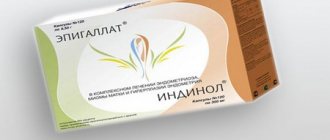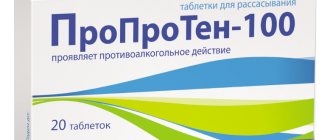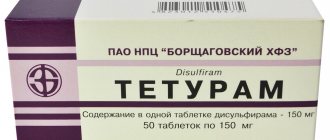Tenorik is a synthetic combination drug with a prolonged and pronounced hypotensive effect due to the combination of two active components in the drug. The tablets belong to the clinical and pharmacological group of antihypertensive medications.
The medicine is sold in a pharmacy, but only with a prescription from a cardiologist or a doctor of another specialization. The price depends on the dosage of active ingredients. The cost of 28 tablets of 50/25 mg is 115-125 rubles, the same amount of 100/25 mg is within 150 rubles.
A description of the drug Tenorik, instructions for use with dosages, reviews from doctors and patients, substitute analogues and their prices are in our article.
Compound
The drug Tenorik contains 2 active ingredients: atenolol and chlorthalidone . Today, this drug is available in 2 dosages. 1 tablet may contain 50 mg of atenolol and 12.5 mg of chlorthalidone and 100 mg of atenolol and 25 mg of chlorthalidone , respectively.
The excipients in the drug include corn starch, lactose, sodium lauryl sulfate, polyvinylpyrrolidone , talc, as well as isopropanol , silicon dioxide and magnesium stearate. The film coating of the tablets consists of isopropanol, methylene chloride, hypromellose, talc, titanium dioxide, as well as petroleum jelly and macrogol.
Drug review
Composition, release form, pharmacological effect
The blood pressure medicine “Tenorik” is available in the form of coated tablets.
Tablets are packaged in strips or blisters (10 or 14 pieces each). The main active ingredients are the beta blocker atenolol (tenolol) and the diuretic chlorthalidone.
One of the effective drugs that reduce high blood pressure is Tenoric.
Depending on the type of drug - regular tablets and Tenoric 100 or Tenoric Forte - the dosage is:
- atenolol – 50 or 100 mg;
- chlorthalidone – 12.5 or 25 mg.
In the form of excipients, the instructions note the presence of starch, lactose, talc, silicon dioxide, povidone, magnesium stearate, as well as petroleum jelly and isopropanol (coated).
The prolonged hypotensive effect is due to the combined action of the main components of Tenoric:
- Atenolol has a cardioselective beta-blocking effect. The selectivity of the drug is not constant, and with increasing dosage it gradually decreases, so the drug is not recommended for long-term use.
- Chlorthalidone is a diuretic of sulfonamide nature. The main effect of its use is to enhance the action of Atenolol, aimed at lowering blood pressure.
- Both atenolol and chlorthalidone are eliminated from the body extremely slowly. Because of this, the peak concentration of the beta blocker in the blood is observed 2.5–4 hours after taking Tenoric, and for chlorthalidone - after 12 hours.
- The half-life for both components is 8–9 and 45–50 hours, respectively. The hypotensive and antihypertensive effect persists throughout the day.
Experts note that due to the synergy of both components, Tenorik tablets for blood pressure are more effective than taking Atenolol separately with diuretics.
Indications for use
The main purpose of Tenorik is the treatment of arterial hypertension.
To reduce blood pressure, doctors recommend using Tenoric
Sometimes it is also used as an antihypertensive crisis to quickly relieve the condition, very rarely.
Pharmacodynamics and pharmacokinetics
The combined use of atenolol and chlorthalidone slightly affects the pharmacokinetics and pharmacodynamics of each of the active ingredients of the drug.
Atenolol
Absorption and distribution When taking the drug orally, the active substance atenolol is approximately 45-50% absorbed from the gastrointestinal tract. Cmax of this active substance in blood plasma was recorded 2-3 hours after administration. The binding to plasma proteins is quite weak and amounts to only 5-15%.
Metabolism and excretion It has been proven that atenolol does not exhibit significant hepatic metabolism . More than 90% of atenolol , which is absorbed into the systemic circulation, is excreted from the body completely unchanged. And T1/2 reaches about 6-9 hours, but severe renal failure can cause an increase in this indicator, since the kidneys are the main organ through which atenolol .
Chlorthalidone
Absorption and distribution When taking the drug Tenoric orally, the active substance is chlorthalidone by 60-65%. absorbed from the gastrointestinal tract. Cmax is recorded in blood plasma after approximately 10-12 hours. Chlorthalidone has a strong binding to plasma proteins, which is approximately 70-75%.
Excretion Chlorthalidone is excreted by the kidneys and its T1/2 varies within 50 hours.
When not to use
Before starting to use the drug, it is important to exclude medical contraindications
- Severe sinus bradycardia, which is characterized by a decrease in heart rate of less than 60 per minute.
- Significant disturbances in blood flow in peripheral arteries.
- Atrioventricular block II-III degree, accompanied by a violation of the conduction of nerve impulses in the atrioventricular node of the heart.
- Failure of the heart with severe deterioration of blood circulation.
- A benign formation of the adrenal medulla, in which the production of the hormones adrenaline and norepinephrine increases.
- Metabolic disorder, accompanied by a shift in the blood reaction to the acidic side.
- Overdose with intoxication with cardiac glycosides.
- Allergic damage to the bronchi.
- Severe deterioration in kidney or liver function.
- Intolerance to any of the substances of the drug.
Also, tablets are not recommended for patients who have finished taking Verapamil in less than 48 hours.
Important! While using the medication, it is important to control your blood pressure, preferably 2 times a day - morning and evening.
Contraindications
It is not recommended to use Tenoric tablets in the treatment regimen:
- with severe attacks of bradycardia ;
- in the presence of cardiogenic shock ;
- with severe and progressive arterial hypotension ;
- with metabolic acidosis ;
- with severe peripheral circulatory disorders;
- with AV blockade of the first and third degree;
- at SSSU ;
- with pheochromocytoma ;
- for heart failure (acute and chronic);
- with vasospastic angina (so-called Prinzmetal angina );
- with progressive bronchial asthma ;
- with obstructive bronchitis ;
- for diabetes mellitus ;
- for hypoglycemia ;
- for gout ;
- with myasthenia gravis ;
- for acute hepatitis ;
- in acute renal failure ;
- in childhood and adolescence up to 18 years of age;
- with hypersensitivity to the components of the drug.
Side effects
When using Tenoric tablets in a treatment regimen, patients may experience discomfort from the following side effects:
From the cardiovascular system: from bradycardia, increased symptoms of heart failure, orthostatic hypotension, cold extremities, the appearance of arrhythmias, AV blockade, symptoms of intermittent claudication, Raynaud's syndrome.
From the central nervous system and peripheral nervous system: from confusion, dizziness, headache, mood swings, acute psychosis, hallucinations, paresthesia, sleep disturbances, increased fatigue, apathy, disorientation, visual impairment.
From the digestive system: from dry mouth, gastrointestinal disorders, increased levels of liver transaminases, hepatotoxicity with intrahepatic cholestasis, nausea (associated with the use of chlorthalidone), constipation, pancreatitis, anorexia.
From the hematopoietic system: leukopenia, purpura, thrombocytopenia, agranulocytosis, eosinophilia.
Dermatological reactions: alopecia, dry eyes, psoriasis-like reactions, exacerbation of psoriasis, skin rash, photosensitivity.
From the respiratory system: from bronchospasm .
From laboratory parameters: hyperuricemia, hyponatremia, hypokalemia .
Other: from an increase in the number of antinuclear antibodies, decreased potency, impaired glucose tolerance .
However, the drug Tenorik is most often well tolerated by patients. Side effects are rare and so mild that they are rather transient in nature.
What reactions
In general, the drug is not harmful and is quite well tolerated. Sometimes side effects may develop from various body systems:
- Heart and blood vessels - the appearance of a feeling of cold in the extremities, impaired conduction of nerve impulses through the node between the atria and ventricles, bradycardia, the development of heart failure.
- Gastrointestinal tract – nausea, accompanied by periodic vomiting, bringing temporary relief, lack of appetite, abdominal pain.
- Nerves and brain - dizziness, headaches, drowsiness, periodic tonic-clonic convulsions of striated skeletal muscles, short-term memory loss, mood swings, decreased concentration, acute psychosis.
- The liver and biliary tract are manifestations of the toxic effects of the drug, which are accompanied by an increase in the activity of liver transaminase enzymes (AST, ALT) in the blood.
- Kidneys – development of interstitial nephritis.
- Respiratory system – bronchospasm with the development of shortness of breath and dry cough.
- Blood – decrease in the number of platelets, leukocytes in the blood.
- Endocrine system – development of hypoglycemic shock associated with a pronounced decrease in glucose concentration.
- Allergic reactions - skin rash, the appearance of which is accompanied by itching, urticaria (characteristic changes on the skin, which in appearance and subjective sensations resemble a nettle burn), fever.
- Reproductive system – impaired potency in men.
The appearance of signs of side effects is grounds for stopping taking the pills. The possibility of further use of the medicine is determined by the attending physician.
Tenorik tablets: instructions for use
For adults, the average dose of Tenoric is most often prescribed, which is 100 mg, and the recommended starting dose is 50 mg once a day. For older people, Tenoric is most often prescribed in lower doses. In patients with impaired renal function, it is recommended to reduce the frequency of taking the drug if necessary. Please note that the instructions for use of Tenorik contain information that after a long course of treatment with Tenorik, withdrawal should not be carried out abruptly, but gradually.
Special Recommendations
Before starting to use a medicinal product, the specialist must carefully familiarize himself with the medical history of each individual patient, taking into account the characteristics of the body, the presence of allergic reactions to a particular medicinal substance, as well as taking into account some special recommendations regarding the adequate use of the medicinal product. Similar recommendations in the instructions for use include the following:
The drug should be used with caution in patients with concomitant first-degree atrioventricular blockades. The use of Tenoric tablets, due to a decrease in blood pressure, can lead to a decrease in the manifestations of hypoglycemia and hyperthyroidism
If the intensity of heart contractions decreases to 50 beats per minute or less, the use of this medication should be suspended or its dosage reduced. In patients suffering from nicotine addiction, the therapeutic effect of drug treatment may be reduced. It is not recommended to abruptly discontinue the drug, as this may cause withdrawal syndrome, accompanied by a sharp increase in blood pressure. Cancellation of the use of this medication is carried out by gradually reducing its dosage. In case of planned surgical intervention, the use of the medication is stopped two days before it is carried out. The drug "Tenorik" can provoke the occurrence of various allergic manifestations, therefore it is prescribed with extreme caution to people suffering from any form of allergies, especially in cases where patients have experienced allergic bronchospasms in the past. While taking the drug "Tenorik", it is possible to decrease the amount of potassium ions in the blood, which implies periodic laboratory monitoring of such indicators. Since the drug contains a diuretic, during its use there may be a decrease in the production of tear fluid, which must be taken into account if the patient uses contact lenses. Against the background of decreased kidney function, the medication should be used with extreme caution. For patients who have a predisposition to diabetes mellitus, the drug "Tenorik" 100 according to the instructions is prescribed with caution. The active ingredients of these tablets can interact with a large number of other drugs of various pharmacological groups, therefore, in cases of their use, you need to inform the treating specialist about this. Since this drug can increase the level of uric acid in the blood, after laboratory monitoring it is possible to additionally prescribe medications to promote its rapid elimination. When treated with Tenoric, it is not recommended to perform work associated with an increased speed of psychomotor reactions and high concentration of attention. In the pharmacy chain, these tablets are sold only with a prescription from a doctor. Their independent use without the appointment of a specialist is not recommended. When treating with this drug, you should not drink alcohol, as this can cause a sharp drop in blood pressure and increase side effects. This can be confirmed by the instructions for use of the drug "Tenorik".
Overdose
In case of an overdose of Tenoric, the patient may experience severe discomfort from severe bradycardia, arterial hypotension, acute heart failure, bronchospasm, convulsions, and increased drowsiness.
To relieve these symptoms, in some cases, hospitalization in the ICU may be necessary, where gastric lavage . In case of severe arterial hypotension and severe shock, it is recommended to administer plasma or a plasma substitute, and in case of bronchospasm , use bronchodilators. If necessary, hemodialysis or hemoperfusion is also performed.
Interaction
Concomitant use of Tenoric with dihydropyridine ( nifedipine ) and its derivatives may cause an increased risk of developing arterial hypotension , and in patients who suffer from latent heart failure, this combination may cause serious circulatory disorders .
It is also necessary to avoid simultaneous use of cardiac glycosides and beta-blockers , as this can significantly increase AV conduction time.
Beta blockers can also provoke an exacerbation of rebound hypertension , which tends to occur after abrupt withdrawal of clonidine . If both drugs are indicated in the treatment regimen, then the use of beta-blockers must be stopped for several days before completing clonidine . If it is necessary to replace clonidine with a beta-blocker , then the latter is prescribed a couple of days after completion of therapy using clonidine .
Please note that beta blockers concomitantly with class 1 antiarrhythmic drugs, as additive cardiodepressive effects may occur with this combination.
The concomitant use of sympathomimetic drugs such as epinephrine (adrenaline), norepinephrine (norepinephrine) neutralize the effect of beta-blockers .
The hypotensive effect of beta-blockers also reduced by substances such as ibuprofen, indomethacin , which are classified as salicylates and NSAIDs. By the way, the use of large doses of salicylates enhances the toxic effect of these substances on the central nervous system.
Taking medications that contain lithium should also be avoided while using diuretics. This combination causes a decrease in the renal clearance of lithium.
An increased risk and rapid development of arterial hypotension can be provoked by a combination of beta-blockers and general anesthesia . There is also a risk of increased effects of curare-like muscle relaxants.
When taking the drug Tenorik together with MAO class inhibitors, it causes an increase in blood pressure.
When taking Tenoric tablets together with ACE inhibitors ( captopril, enalapril ), a sharp increase in the antihypertensive effect may occur at the initial stage of therapy.
When Tenorik is combined with GCS, amphotericin B, and furosemide, potassium excretion increases.
The effect of insulin and the effectiveness of oral hypoglycemic agents may be reduced when used simultaneously with Tenoric. That is why patients taking these medications need to regularly monitor their blood glucose levels.
Antihypertensive drugs such as tricyclic antidepressants, phenothiazines , as well as barbiturates, diuretics and vasodilators can enhance the antihypertensive effect of Tenorika tablets.
Taking beta-blockers together with calcium channel blockers has a negative inotropic effect and leads to the potency of this effect. decreased myocardial contractile function should be especially careful , since this treatment regimen can cause severe arterial hypotension , severe bradycardia and heart failure . Be careful! Do not use a calcium channel blocker for 48 hours after you stop taking beta blockers .
Severe bradycardia can also occur when Tenoric is co-administered with reserpine, clonidine, and guanfacine.
Please also pay special attention to the fact that taking two or more medications can either weaken or enhance the effectiveness of each other.
Causes of high blood pressure (arterial hypertension)
Cardiovascular diseases occupy the first place among the causes of mortality in the population. These include hypertension, which occurs most often in patients over 40 years of age. In the first stages, when the pathology is just beginning, symptoms practically do not appear, and mild malaise, headache, dizziness are often attributed to banal fatigue of the body.
The main causes of hypertension include:
- Disturbances in the functioning of the endocrine system.
- Disturbed metabolism in the body.
- Increased cholesterol levels.
- Overweight, obesity.
- Bad habits (especially smoking).
- Inactive lifestyle.
- Regular consumption of junk food.
- Genetic predisposition.
Depending on the stage of hypertension, the attending physician must select medications that will help keep blood pressure at the desired level. For treatment of grades 1 and 2, Tenoric can be prescribed, the price of which depends on the dosage of the active components. It should be borne in mind that for a positive result it is necessary to radically change the diet, habitual way of life and constantly monitor blood pressure indicators.
Reviews of Tenorique
Tenorik's average rating on the forums is only 3.3 on a 5-point scale.
The main advantages of the drug Tenorik forum visitors include:
- efficiency;
- low price.
Discussion participants believe that the disadvantages of this drug are that these blood pressure pills:
- may become a cause of hair loss and impotence ;
- cause convulsions .
Having analyzed the reviews of doctors about Tenorik on the forums, we can conclude that before starting to use it, it is necessary to consult with your doctor. Also, reviews of Tenorik often contain a recommendation that older people should not take this drug.
In search engines, one of the most common questions is “Tenoric Tablets for what?” Experts answer that these tablets are used in treatment regimens exclusively for arterial hypertension.
There is no information about the drug Tenoric on Wikipedia.
Pharmacological characteristics of the drug
Why is a drug such as Tenorik prescribed? Reviews from doctors indicate that this is a combined antihypertensive drug that produces a fairly long-lasting hypotensive effect.
The work of the medication is due to the action of its two components: a diuretic (that is, chlorthalidone) and a beta1-blocker (that is, atenolol). Let us consider the features of these substances in more detail:
- Atenolol is a beta1-blocker (cardioselective). Its selectivity decreases with increasing dose. It does not have internal membrane-stabilizing and sympathomimetic effects. It should be noted that, like other beta-blockers, it reduces heart rate and has an inotropic negative effect.
- Chlorthalidone is a sulfonamide non-thiazide diuretic. It enhances the release of chlorine and sodium, and also increases the release of magnesium, potassium and bicarbonate. The antihypertensive effects of this substance are related to sodium excretion. The simultaneous use of atenolol with diuretics gives a more effective result than the use of each of these elements separately.
How long does Tenorik last? Reviews from experts say that the effect of this drug lasts throughout the day (after a single dose of the medicine orally in a daily dosage).
Tenorika price, where to buy
The average price of Tenorik in Ukraine is 35 UAH.
You can buy the medicine Tenorik in Moscow for 102 rubles.
- Online pharmacies in RussiaRussia
- Online pharmacies in UkraineUkraine
- Online pharmacies in KazakhstanKazakhstan
ZdravCity
- Tenoric tablets p.p.o.
50mg+12.5mg 28 pcs. Ipca Laboratories Ltd RUB 150 order - Tenoric tablets p.p.o. 100mg+25mg 28 pcs. Ipca Laboratories Ltd
RUB 195 order
Pharmacy Dialogue
- Tenoric tablets 50/12.5 mg No. 28) Ipka Laboratoris
RUB 156 order
- Tenoric tablets 100/25 mg No. 28) Ipka Laboratoris
RUB 218 order
show more
Pharmacy24
- Tenorik 62.5 mg No. 28 tablets IPKA Laboratories Limited, India
61 UAH order - Tenorik 125 mg No. 28 tablets IPKA Laboratories Limited, India
78 UAH order
PaniPharmacy
- Tenoric tablets Tenoric tablets. 125 mg No. 28 India, IPCA
98 UAH order
- Tenoric tablets Tenoric tablets. 62.5 mg No. 28 India, IPCA
70 UAH order
show more

